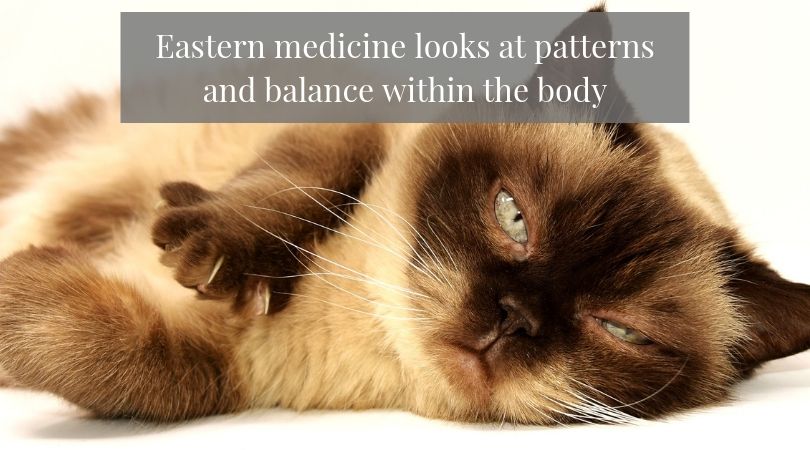In Eastern medicine, the heart is the organ that controls mental vitality; it is the seat of consciousness. It also governs the blood. Increasing anxiety is often observed with heart disease. In fact, the changes in consciousness can actually be severe enough to cause seizures.
For companion animals, it can be incredibly useful to have both an Eastern and Western diagnosis when treating diseases that affect the heart and lungs. In many cases, conventional medications and herbal supplements may be used together. But why use herbs at all?
Timing of Signs and Symptoms
Simply put, Western medicine does not start treatment in dogs and cats unless physical signs of heart disease are present. Alternately, Eastern medicine can help address bodily imbalance before conventional, Western-recognized physical symptoms appear.
For example, symptoms such as coughing or X-ray changes must be severe enough to warrant medication for heart disease from a Western perspective. Eastern medicine, on the other hand, looks at patterns and balance within the body.

Causes of Cardiopulmonary Disease from an Eastern Perspective
From an Eastern perspective, most cases of heart disease are related to conditions of blood stasis or triple burner obstruction or both. In other words, the blood becomes trapped; blood and qi do not flow freely. This would eventually lead to the structural changes we see on X-rays or an echocardiogram. The Eastern approach starts treatment much sooner and aims for the root of the disease to eventually be uncovered and dealt with.
When Eastern Medicine May Be More Beneficial Than Western Medicine
We must also consider pets that cannot handle medications because of the side effects. These pets may benefit from the addition of herbal supplements. Similarly, there are cases in which medications are no longer helping, and looking from a different perspective can be beneficial.
What the Eastern Approach to Cardiopulmonary Disease Means for Pets
In Eastern medicine, the job of the lung is to gather the qi that is inhaled through breathing and the qi that is raised up from digestion. From here it descends to the kidneys where it is stored. In order for the qi to descend, however, the kidneys must be strong enough to reach up and grab it. Often, respiratory diseases that start in older animals are related to weakening kidneys that can no longer grasp the descending qi.
 Respiratory issues are also often blockages with qi trapped in the upper half of the body. With respiratory disease, especially in cats, dampness can be the underlying root of the blockage. Dampness in cats is often related to the chronic feeding of foods that are high in carbohydrates. It is always important to look at diet in these instances.
Respiratory issues are also often blockages with qi trapped in the upper half of the body. With respiratory disease, especially in cats, dampness can be the underlying root of the blockage. Dampness in cats is often related to the chronic feeding of foods that are high in carbohydrates. It is always important to look at diet in these instances.
It can be confusing to think of bronchitis being a kidney problem or seizures being a heart problem, but in Eastern medicine, treating only the symptoms of disease is like looking only at the leaves on a tree. The disease pattern must be traced back to its root. Fortunately, Eastern and Western approaches work very synergistically in the treatment of most disorders.
If you have questions or concerns about your dog or cat’s health, please be sure to contact us!

